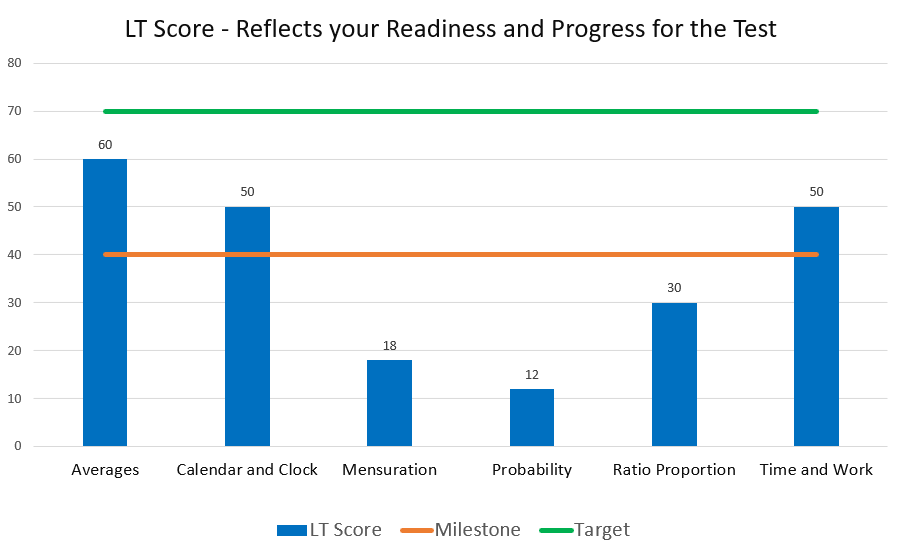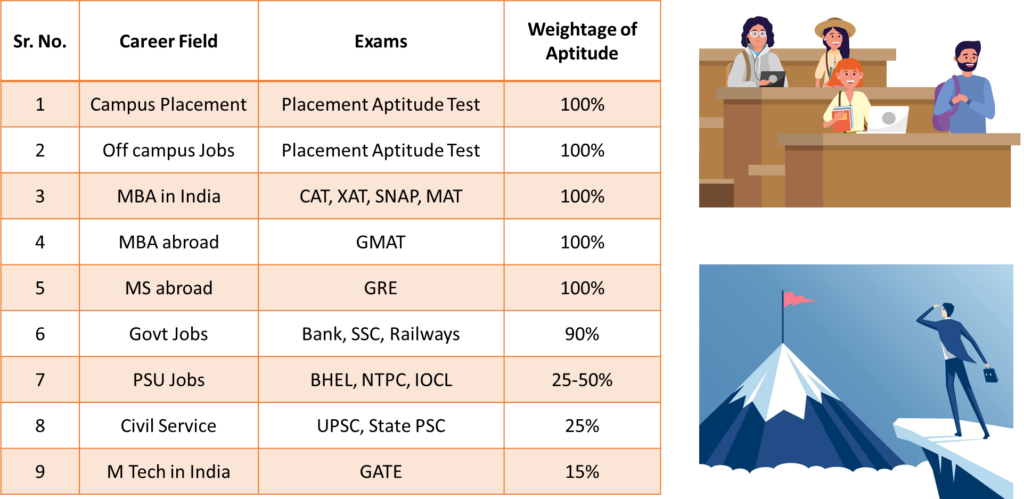How to Prepare Aptitude for Placement Tests?
One of the most frequent questions we receive from students is “How do I start preparing for placement aptitude exams?” Many struggle with deciding where to begin, how much time to invest in each section, and which topics to prioritize. Please find list of free resources for aptitude prep
Step 1: Understand the Syllabus for Aptitude
Aptitude tests typically cover Quantitative Aptitude, Logical Reasoning, and Verbal Ability. You can get an idea of the syllabus and relative importance of topics from the image. We have broken it down section-wise in next Step. Here is the quick list for reference: https://www.learntheta.com/aptitude-syllabus-placement/
Step 2: Brush Up Concepts of Important Topics
This helps you build a strong foundation, making it easier to solve aptitude questions later. As you start preparing, you’ll find that mastering one topic can make learning others faster and easier.
Quantitative Aptitude (18 hrs)
Quantitative Aptitude is usually the most weighty section in placement exams, and a solid understanding of core topics can give you a major advantage.
How to approach:
- Start with the most important topics (1-11), prioritized by relevance in placement tests (refer to the table below).
- Brush up your basics: Go through the important concepts, formulas and examples in the linked pages below for each topic. We have also included some handpicked YouTube videos for each topic
- After studying each topic, review at least 10 aptitude questions before moving to the next one.
| Sr No | Topic | Importance | Difficulty | Brush Up Concepts | Review 10 Qs | Tentative Time |
|---|---|---|---|---|---|---|
| 1 | Percentages | High | Easy | 45 min | 45 min | 90 min |
| 2 | Ratio & Proportion | High | Easy | 30 min | 45 min | 75 min |
| 3 | Profit, Loss and Partnership | High | Easy | 45 min | 45 min | 90 min |
| 4 | Averages, Mixture and Alligations | High | Easy | 45 min | 45 min | 90 min |
| 5 | Time and Work | High | Easy | 45 min | 45 min | 90 min |
| 6 | Time, Speed and Distance | High | Easy | 60 min | 45 min | 115 min |
| 7 | Simple and Compound Interest | High | Easy | 30 min | 45 min | 75 min |
| 8 | Numbers | High | Difficult | 90 min | 45 min | 135 min |
| 9 | Algebra | High | Difficult | 90 min | 45 min | 135 min |
| 10 | Permutation combination | High | Moderate | 45 min | 45 min | 90 min |
| 11 | Probability | High | Moderate | 45 min | 45 min | 90 min |
| 12 | Mensuration | Med | Moderate | 45 min | 45 min | 90 min |
| 13 | Geometry | Med | Difficult | 90 min | 45 min | 135 min |
| 14 | Data Interpretation | Med | Moderate | 45 min | 45 min | 90 min |
| 15 | Statistics | Low | Easy | 30 min | 45 min | 75 min |
| 1-11 | 11 Important Topics | 10h | 8h | 18h |
Logical Reasoning (10hrs)
Logical Reasoning tests your ability to think critically, identify patterns, and solve problems quickly. The key to excelling in this section is consistent practice.
How to approach:
- Begin by familiarizing yourself with different types of reasoning questions. Prioritize topics 1-8.
- After understanding the basics of each topic, go through at least 10 reasoning questions per topic.
| Sr No | Topic | Importance | Difficulty | Brush Up Concepts | Review 10 Qs | Tentative Time |
|---|---|---|---|---|---|---|
| 1 | AlphaNumeric Series | High | Easy | 30 min | 45 min | 75 min |
| 2 | Blood Relations | High | Easy | 30 min | 45 min | 75 min |
| 3 | Coding Decoding | High | Moderate | 30 min | 45 min | 75 min |
| 4 | Data Sufficiency | High | Moderate | 30 min | 45 min | 75 min |
| 5 | Direction Sense | High | Easy | 30 min | 45 min | 75 min |
| 6 | Statement & Conclusion | High | Moderate | 30 min | 45 min | 75 min |
| 7 | Arrangements | High | Moderate | 30 min | 45 min | 75 min |
| 8 | Calendar and Clocks | High | Easy | 30 min | 45 min | 75 min |
| 9 | Decision Making | Med | Moderate | 30 min | 45 min | 75 min |
| 10 | Visual Reasoning | Med | Easy | 30 min | 45 min | 75 min |
| 11 | Puzzles | Low | Difficult | 30 min | 45 min | 75 min |
| 1-8 | 8 Important Topics | 4h | 6h | 10h |
Verbal Ability (12 hrs including 10 hrs for reading)
This section often intimidates non-readers, but with consistent effort, it can be mastered. Verbal ability questions typically test your grammar, vocabulary, comprehension, and logical reasoning within language.
- If you don’t already have a habit of reading, start small—15 to 30 minutes of reading daily can work wonders over time. Focus on a mix of fiction, non-fiction, news, or any subject that interests you.
- As you build your reading habit, you’ll find that verbal ability questions become easier. Your vocabulary will expand, and comprehension skills will naturally improve.
- After mastering the fundamentals, move to topic-specific verbal ability questions.
| Sr. No. | Topic | Importance | Difficulty | Initial Practice (10 Qs) |
|---|---|---|---|---|
| 1 | Synonym Antonym | High | Easy | 10 min |
| 2 | Fill in the blanks (grammar based) | High | Easy | 15 min |
| 3 | Find error (grammar based) | High | Moderate | 15 min |
| 4 | Verbal analogies | High | Easy | 15 min |
| 5 | Sentence correction | High | Moderate | 15 min |
| 6 | Reading Comprehension | High | Difficult | 30 min |
| 7 | Parajumbles | Med | Moderate | 15 min |
| 8 | Meanings | Med | Easy | 10 min |
| 9 | Cloze test | Low | Easy | 15 min |
| 10 | Idiom Phrases | Low | Easy | 10 min |
| 11 | Critical Reasoning | Low | Moderate | 15 min |
| 1-6 | 6 Important Topics | 2 h |
Step 3: Focused Practice & Progress Tracking (Practice till you reach score of 70 in each topic)
In this phase, Sign Up on LearnTheta and start practicing questions and tracking your performance. You will sharpen your concepts, improve accuracy and speed in the process. It’s ok to go slow initially. Different students will have different learning curves based on how much exposure they had earlier. But whether slow or fast, just hang on and you will definitely see yourself improving over time.
Make use of LearnTheta’s performance page (LT score) to gauge how well you’re doing. You should aim to be in the 40-70 score range. If you’re below 40, revisit the concepts. If you’re between 40 – 70, you are doing well and you need to keep practicing to reach score of 70. Once you have reached 70, you are all set for any placement tests and even for some of the competitive exams.

PDF copy of Placement Aptitude Preparation Plan!
Organize your preparation with a detailed breakdown of topics and practice hours

Crack Aptitude Tests with LearnTheta’s AI Practice
Adaptive Practice | Real Time Insights | Resume your Progress
Things you must know:
1. Anyone willing to put sincere effort can Crack Placement Aptitude
Sounds cliché? Let us explain. In exams like CAT, UPSC, or GATE, you need to score in the 90+ percentile, meaning you have to outperform 90% of the students. Placement aptitude, however, is a qualifying exam. Typically, campus screenings filter out around 50% of candidates. So you don’t need to be extraordinary—you just need to do better than the average student to qualify.
That said, preparation is key. In our experience, anyone who has put in genuine effort towards aptitude prep has successfully cleared it. And here’s the good news: the syllabus is mostly 10th-grade! So, with focused preparation, cracking it is absolutely within reach. Also since aptitude is conceptual in nature, preparing for one topic helps you improve in other topics as well automatically

2. You can’t improve in just a week’s time
Sure, you can practice and get into the exam-solving mode, but real improvement takes time and consistent effort. Just like you can’t train for a marathon in a few days, and you can’t become a swimmer by watching swimming tutorial videos, you certainly can’t master aptitude with just browsing through notes and videos. To truly improve, you need to start early, study the topics and practice good amount of questions. But the good news is, if you put in the effort over time, you will absolutely see progress. It’s a process, that’s guaranteed to pay off not just in placements but in other career opportunities too.
3. Conceptual clarity over Shortcuts
Always strive to be conceptually clear when attempting any question. No matter how much you’ve studied, an aptitude problem can always be modified to test your deeper understanding. If you rely only on shortcuts, a small tweak in the problem might throw you off. Shortcuts only apply to specific, restricted scenarios, while strong conceptual understanding allows you to tackle any problem, regardless of its form. It’s tough to remember countless shortcuts for different problems. A clear grasp of the fundamentals, however, applies universally and sticks with you longer.
Every topper without exception masters the concepts first. You’ll never find someone who achieves top ranks just by memorizing shortcuts. Even if they use shortcuts, it’s only because they fully understand the concept behind them. This deeper understanding is what often goes unnoticed by beginners, but it’s the key to success in aptitude exams.
4. Aptitude preparation: helpful for job and higher studies
Preparing for aptitude tests is not just about securing an on-campus job—it’s a skill that will benefit you in off-campus opportunities and higher education as well. Even if you already have a job, many companies use aptitude tests as part of their screening process when you’re looking to switch or explore better roles during initial years.
If you’re considering higher studies, aptitude plays a significant role in exams like CAT, GRE, TOEFL, GMAT, UPSC, GATE, Govt exams, or PSU tests. Most of these exams have a strong focus on aptitude (except for GATE, which allocates about 10% weightage to it). Building a solid aptitude foundation now will make it easier to tackle these exams in the future, opening doors to various career and academic opportunities.

Read more details here: https://www.learntheta.com/aptitude-importance-engineering-students/
5. Practice makes all the difference!
Brush up on the basics, but don’t spend too much time just reading theory. Start practicing as soon as possible. Simply reading solutions or watching video is like trying to learn how to swim by watching YouTube videos—it doesn’t work. You need to actively apply what you’ve learned by solving problems regularly. Practice trains your mind to recognize patterns, boosts your speed, and builds your confidence. The more you practice, the better prepared you’ll be for the actual exam
I am not afraid of a person who knows 10000 kicks. But I am afraid of a person who knows one kick but practices it for 10000 times.
– Bruce Lee

Improve Aptitude with LearnTheta’s AI Practice
Adaptive Practice | Real Time Insights | Resume your Progress
